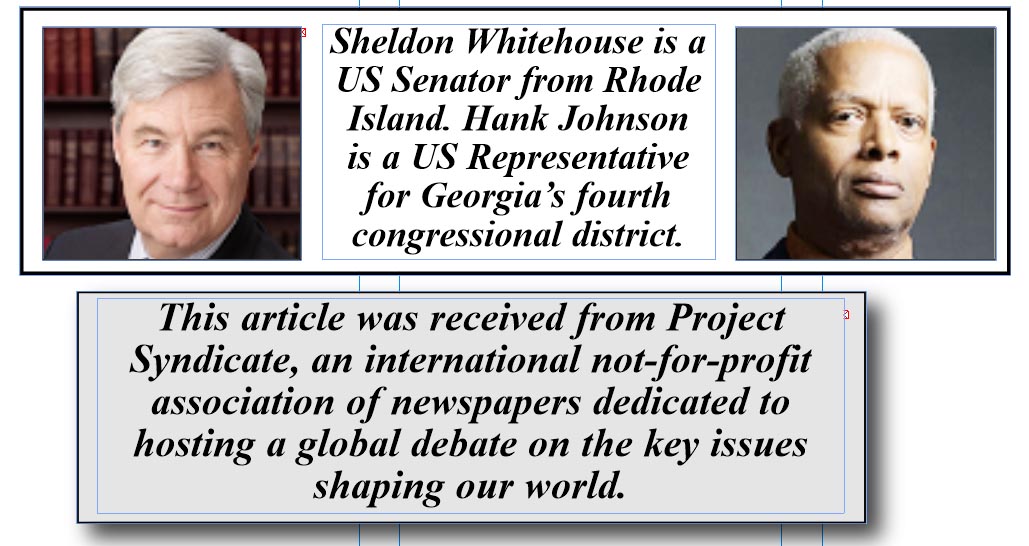By Sheldon Whitehouse and Hank Johnson
WASHINGTON, DC – America’s courts are under siege from right-wing special interests. They want to rig the federal judiciary to favour large employers over workers, mega-banks over small businesses, and gun manufacturers over gun victims. Again and again, the political agenda pushed through the Federalist Society, a group that has done more than any other to move the federal judiciary far rightward, has become the law of the land at the expense of everyone else. And now, if this operation gets its way in a little-noticed case before the Supreme Court, secretive interests will cement their upper hand in US constitutional law for generations to come.
As the chairs of the Senate and House subcommittees on courts, we have closely observed the alarming encroachment of dark money on the judiciary. The undisclosed interests wielding that influence dictated the last three nominations to the Supreme Court, and then pressured the Senate to ram the nominees through, including by spending millions of dollars on national television and radio ad campaigns (especially for Justice Brett Kavanaugh when his nomination ran into trouble).
Having helped to install sympathetic jurists on the federal bench, a web of financially interconnected legal groups then takes turns setting up cases to land in the Supreme Court, where they file coordinated amicus (“friend of the court”) briefs in support of the outcome they are pitching. Resembling a strategically conducted orchestra, the amicus effort is the closing movement of a massive court-capture operation.
The key to this operation is dark money: donations that cannot be traced to a donor. Special interests have built a massive network of dark-money front groups to carry out every function of court capture, from selecting judicial nominees, to picking cases for them to hear, to lobbying through amicus briefs for the outcomes they desire. From 2014 to 2018 alone, this network received $400 million in dark money, according to recent expert testimony to the senate..
It’s an unfortunate fact that this dark-money campaign is working. Even before Justice Amy Coney Barrett joined the Court in the dying days of Donald Trump’s administration, the Republican majority of five had run up an 80-case streak of partisan 5-4 victories for big Republican donor interests. But the real payoff could come in Americans for Prosperity Foundation v. Rodriquez, where the Court may decide that a right-wing donor elite has a constitutional right to secrecy when it uses front groups to influence politics and courts.
The parties in the case tell us much about what is at stake. The Americans for Prosperity Foundation is part of the constellation of dark-money front groups funded by billionaire energy mogul Charles Koch, and its Americans for Prosperity affiliate provides the political muscle for the operation. Still more telling is the array of “amici” who flocked to the case even before the Supreme Court agreed to hear it. These groups often appear in well-organized armadas before the Court, but the presence of more than 60 dark-money front groups in this case indicates that something big is afoot.
The explanation lies in Congress, where powerful corporate entities deeply involved in dark-money operations have begun openly refusing to answer questions about dark-money funding. In doing so, they are “pleading the First” – claiming a previously unknown First Amendment right to operate covertly in politics through dark money.
Ironically, the requirement that political spending be transparent was established by the Supreme Court’s 2010 Citizens United ruling, which opened the door wide for big money in politics. But the Court has made no effort to insist on adherence to its transparency requirements, and now that the Court’s political balance has lurched rightward, those requirements on paper may be shredded.
Justice Clarence Thomas was alone in opposing the disclosure requirements back in 2010. But three new justices have since been ushered onto the bench by dark-money forces, and Justice Samuel Alito seems likely to flip to the dark side. That makes a plausible majority of five for unlimited dark money. Certainly, whoever is behind those 60 amici thinks so.
Needless to say, the special interests that have built a massive influence machine around the federal judiciary will protect it at all costs. No dark money would mean no machine, and no machine would mean no influence. It is as simple as that. Today’s Supreme Court – the Court that dark money built – may be the one to lock in dark money for the long term.
As politicians, we are convinced that Citizens United was wrongly decided, and we are deeply disappointed that the Court never enforced its decision’s own terms. We have witnessed widespread obstruction and corruption in Congress as a result of these failures, and we believe these problems are factors in the public’s dissatisfaction with government.
For the Court to offer constitutional protection to dark-money schemes would make matters much worse. An informed citizenry is one of the few checks on power and influence in government. Deny citizens information about what is going on around them and in their government, and you have struck a deadly blow against democracy.
That would certainly suit the autocratic dark-money forces that worked so hard and spent so much to shape the current Supreme Court. Democracy is what these forces oppose. They want power for billionaire puppet masters operating from behind the dark-money curtain. We cannot let that happen.
Copyright: Project Syndicate, 2021.

